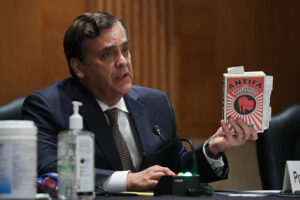Clarence Thomas Quitting GW Law School Is Just Like Robespierre's Reign Of Terror Except In The Way It's Not At All And Jonathan Turley Is A Wildly Unserious Person
Grease up your toboggan for a trip down the slipperiest of slopes.

(Photo by Chip Somodevilla/Getty Images)
Clarence Thomas informed George Washington Law that he’s unavailable to co-teach the seminar he’s taught the last few years where the school kicks him a bit of money to trade on the prestige of employing a Supreme Court justice and George Washington Law professor and captain of the S.S. Hyperbole Jonathan Turley has grave concerns about this:
This is why many choose to remain silent as the mob pursues their colleagues. For those tagged as dissenters, the atmosphere is perfectly Robespierrean. French revolutionary leader Abbe Sieyes captured this atmosphere as a liberal thinker who was later suspected of being an independent thinker.
When asked what he had done during the Reign of Terror, he replied: “I stayed alive.”
The Reign of Terror chopped off people’s heads. Turley’s complaining that one of the most powerful officials in the United States government can’t collect an extra paycheck for a vanity course. It’s like how the discontinued Choco Taco sparked an atmosphere that’s perfectly Irish Potato Faminesque.
If anything you’d think celebrating a high official using his office to shield that his wife encouraged the Trump administration to send the duly elected American government to offshore military detention barges is much closer to “perfectly Robespierrean” but I digress.
This passage forms the conclusion to Turley’s latest article on cancel culture where he uses Thomas as “the latest example of how dissenting viewpoints are being systematically eliminated in higher education.” Which sounds vaguely troubling until you realize it’s complete nonsense.
Because while academic freedom is important, you can’t willy nilly take the “academic” out of academic freedom. Contrary to Turley’s assertion, dissenting viewpoints aren’t an academic good in and of themselves or we’d have Flat-Earth astronomy professors. Academic freedom is about protecting scholars in exploring unorthodox hypotheses in the advancement of the field. It’s not about allowing people to trade on an institution’s credibility while they gin up 15 minutes of personal fame misleading the public about fundamental principles.
Sponsored

Curbing Client And Talent Loss With Productivity Tech

Generative AI at Work: Boosting e-Discovery Efficiency for Corporate Legal Teams


AI Presents Both Opportunities And Risks For Lawyers. Are You Prepared?
Such attacks are now a common factor of life for many faculty members offering dissenting views on issues ranging from impeachment to diversity programs to police abuse to transgender identification to vaccines to native-land acknowledgment.
Each of these examples is amazing. The “diversity programs” reference is about a geophysical sciences professor who complained to Newsweek that diversity is bad for education. The “police abuse” example is a psychology professor who tweets that he doesn’t think police shootings are really about race. The “transgender identification” story is titled “Harvard Cancels British Romanticism Scholar Due to Her Views on Gender Issues.” The native land issue is a computer science professor.
What do they all have in common?
Every single one of them got in trouble for mouthing off about something outside their subject area. It’s not academic freedom when an accounting professor says he’s sick and tired of the laws of thermodynamics. At least the vaccine guy was an immunologist, though he went to the media to ask if maybe COVID deaths were being overhyped which is the sort of thing a more responsible practitioner might have tried to hash out with the benefit of peer review. His problems with the school seem grounded in his slip-shod approach.
But the university isn’t helped by any of these people. Their “dissenting views” aren’t adding to the academic mission. They’re just trolls who want their unrelated accomplishments to grant them permanent immunity from the consequences of their actions.
Sponsored

AI Presents Both Opportunities And Risks For Lawyers. Are You Prepared?

Law Firm Business Development Is More Than Relationship Building
Yet, there is now an overwhelming fear among faculty and students that they could be next to be targeted in a cancel campaign or to be shunned by colleagues. These campaigns threaten everything that brings meaning to an intellectual from access to classes to conferences to publications.
As Professor Dave Karpf, also at GWU, notes: “I teach at the same university as @JonathanTurley. There is no ‘overwhelming fear among faculty.’ Turley is just making this up.” Because the overwhelming majority of intellectuals are actually doing their jobs and pursuing their scholarly work and not trying to side hustle up a fan base with the QAnon set. The sliver of academics undermining the credibility of their institutions in that way should face consequences.
And those consequences are in no way whatsoever akin to the darkest days of the French Revolution.
 Joe Patrice is a senior editor at Above the Law and co-host of Thinking Like A Lawyer. Feel free to email any tips, questions, or comments. Follow him on Twitter if you’re interested in law, politics, and a healthy dose of college sports news. Joe also serves as a Managing Director at RPN Executive Search.
Joe Patrice is a senior editor at Above the Law and co-host of Thinking Like A Lawyer. Feel free to email any tips, questions, or comments. Follow him on Twitter if you’re interested in law, politics, and a healthy dose of college sports news. Joe also serves as a Managing Director at RPN Executive Search.







